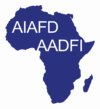
The 2023 Joint International CEO Forum of the Association of African Development Finance Institutions (AADFI) and the Association of Development Financing Institutions in Asia and the Pacific (ADFIAP) was held from November 8 to 10, 2023, at the Transcorp Hilton Hotel in Abuja, Nigeria. The Forum was hosted by the Bank of Industry (BOI), Nigeria, on the theme “DFIs’ Strategic Role Towards A Climate-Smart Future”.
The main objective of the event was to provide a platform for leaders of DFIs and partners to share best practices, exchange knowledge and experiences, and explore opportunities for collaboration in addressing the challenges posed by climate change. In addition, the Forum was aimed to strengthen south-south cooperation in addressing development challenges.
The Opening Ceremony recorded the presence of the Honourable Minister of Trade & Investment, Dr. Doris Uzoka Annite, represented by Dr. Mimi Abu, Director of Human Resources in the ministry; Dr. Olasupo Olusi, MD/CEO of the Bank of Industry (BOI) Nigeria; Mr. Thabo Thamane, Chairman of AADFI and CEO of CEDA; Mr. Mominul Islam, Chairman of ADFIAP, represented by Mr. Roland Tepora, Senior Vice President of the Development Bank of the Philippines (DBP); Dr. Olayemi Cardoso, Governor of the Central Bank of Nigeria, represented by Mr. Mustapha Haruna, Director of Banking Supervision; Mr. Emmanuel Tutuba, Governor of the Bank of Tanzania; and Dr. Kevin Kariuki, Vice-President of the African Development Bank (AfDB) in charge of the Power, Energy, Climate Change and Green Growth (PECG), represented by Prof. Anthony Nyong, Director for the Climate Change and Green Growth Department.
More than 300 delegates attended the event, comprising chief executive officers and senior management executives of DFIs in Africa, Asia, Latin America, and other regions; multilateral development finance institutions (MDFIs); officials of DFIs supervisory authorities and government agencies responsible for promoting climate change agenda in the regions; officials of central banks, ministries of finance, commercial banks, MNCs, MSMEs, MFIs, and other stakeholders.
Twenty-nine (29) countries worldwide were represented at the event, namely Botswana, Canada, Côte d’Ivoire, DR Congo, Eswatini, France, Gambia, Germany, Ghana, India, Iran, Kenya, Lesotho, Morocco, Namibia, Niger, Nigeria, North Cyprus, Oman, Philippines, Russia, Samoa, Seychelles, South Africa, Sudan, Tanzania, Togo, Uganda, and Zimbabwe.
The conclusions and recommendations of the Forum were as follows: (1) Climate change is a major threat to socio-economic development and a clog in achieving the SDGs, particularly in the less developed regions of Africa and Asia. (2) The cost of financing the shift toward a climate-smart future is enormous. Meanwhile, access to the various Green Investment Funds (GIFs) is complex. (3) Development Finance Institutions have a strategic role to play in scaling up the achievement of the SDGs and attaining a climate-smart future. However, lack of access to funding and capacity gaps are common challenges in most national development finance institutions, which hinder progress. As a result, the financial architecture should be restructured to ease their accessibility.
Moreover, development partners should support the efforts to bridge the capacity gap in DFIs through innovative technical assistance and capacity-building programs. (4) The Forum endorses the Nairobi Declaration Call to Action and highlights the need to scale up collaboration and partnership to achieve a climate-smart future.
